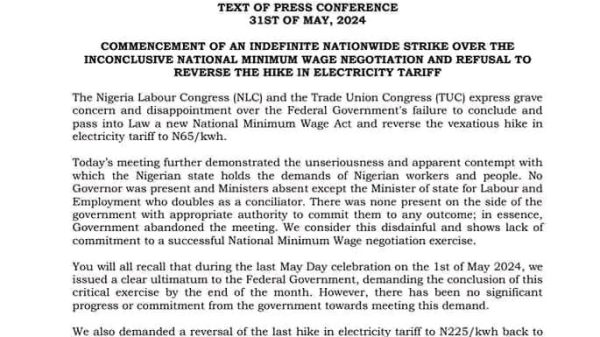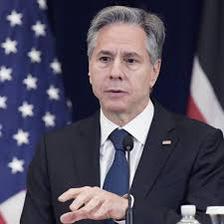NIGERIAN ECONOMY AND THE POLITICAL INTRIGUES OF OIL SUBSIDY (1)
By Ussiju Medaner
(Published In The Peoples Daily Newspaper, Wednesday Column, 2nd, August, 2023)
The current realities of the present Administration’s halting of the age-long fuel subsidy in the country appears to be beyond the scope of the citizens’ comprehension of the subsidy removal policy. Perhaps, it would have been necessary in the first place for the government to carry out adequate sensitisation, and education as well as engage with the public to ensure citizens’ preparation before the oil subsidy removal; but it is now obvious that Nigerians were short of the continuous implications of the policy. We would however continue to reiterate the need for the full implementation of the policy, while equally harping on the need for the people to have full knowledge of what to expect of the removal and the long-term implications of retaining the subsidy policy. A better public sensitisation and education program on the subject matter by the present Administration would go a long way in this regard.
The pump price of PMS stays at #617 and may gradually drop as more players come into the market and the forces of demand and supply take over; that is the message of hope the Nigerian people were holding on to. The expectation is that the much-awaited Dangote refinery would start production sometime soon in 2024 and our refineries would also pick up at some capacity to take off the cost of international purchases, transportation, taxes, and logistics that accompany the importation of finished petroleum products. That has not happened and is unlikely to happen any time soon. So, what is to be expected?
Fuel subsidy is the loss of revenue that should have accrued to the Federation account were the crude allocated for domestic consumption is sold at international market prices, rather than at the subsidised price that it is sold. While this is not sustainable, here are the realities: the moment the decision to remove the long-standing subsidy payment from the government book, the country, and the citizens become totally subjected to both the international and local petroleum economic forces and principles. Without a subsidy regime, every other consumer of the petroleum product becomes subject to the dictates of the global forces of demand and supply of the product, clearly beyond the control of any individual country or force. Several factors contributing to regular supply shocks in the industry are the concerns of the market and industry players; the cost of crude would always have to respond to these shocks regardless of the cause.
For a period starting in 2014, the world experienced a slump in oil prices. With a low demand and supply price elasticity, and disturbance created by meltdowns in global economic prospects, the global demand for petroleum products dropped and so did the international oil prices. At some other times, armed conflicts, discoveries and extraction technology, and strategic decisions by OPEC, also created disturbances that have influenced crude prices in the international market in either an upward or downward direction.
Another important prominent factor is availability and production to meet the demand for the product. According to some experts, relatively inexpensive crude production has already peaked a couple of years ago and the world has only continued to see increased production as a result of increased expensive technologies of enhanced recovery as well as the exploitation of much difficult shale oil and oil sands. Thus, global oil production is depleting. In fact, the depletion rate for existing conventional fields is estimated to be between 3 and 4 percent yearly and at that rate, existing fields would shrink from supplying 68.3 million barrels per day in 2015 to 44.6 million barrels per day in 2025. That is expected to result in a shortfall in supply to the tune of 23.7 million barrels per day. It is therefore only realistic that oil prices would soar in response to exploitation and production costs as much as supply shortages. The more it costs to explore, drill, complete wells, produce and maintain them, the more the price per barrel would be. It is a fact, all things being equal, that as oil reserves deplete, supply will slump, and prices will rise.
Also is the fact that with an increased global population and GDP would come increased demand for petroleum products to supply global energy, and expectedly oil prices would start rising in response. The world population is geometrically exploding, and so is the global demand for the product. Obviously, the cost would go up.
On the part of the oil companies and producing nations, higher prices per barrel will stimulate increased investment in exploration, and production and they would do everything possible through organised corporations to keep the price up.
All these analyses speak about the price per barrel of crude; the refineries buy the crude at prevailing prices, refine and sell to meet costs and set profit margins. The current price per barrel of crude is pegged at $84.99. Then, we would be looking at the refining cost of the crude by the refineries; this would integrate the variable refinery costs covering the cost of chemicals, catalysts, and other consumables of the refinery processes. Also, the fixed cost components covering personnel, maintenance, insurance, local taxes, overheads, and others are relatively independent of the quantity of processed crude. All these put together, the production cost per barrel is averaged at $5.40 a barrel but may rise to as much as $10.
At this, the cost of crude purchase and refinery per barrel is between $90.39 at the least to a peak of $94.99. The other costs that have to be factored into it for consumers in Nigeria would be the cost of transporting the refined products from refineries in the Netherlands, Belgium, Norway, India, and the UK, as well as the transport logistics within the country and taxes. Freight costs $3.72 per barrel, lightering cost, NPA charges, NIMASA charge, jetty throughput charge, storage charge, and financing per barrel of $3.0. With these, we are talking of a total cost of between $97.11 and $101.71 per barrel of refined crude to get the product to Nigeria. Converting to litres, with 159 litres in one barrel, this cost translates to between $0.611 and $0.64 per litre PMS landing cost. Finally, we will look at insurance, loan interest payments, and feasible interest level for business owners at about N100 per barrel, and so, with the prevailing exchange rate, we would be looking at probable pump price in the range of N607 to N611,
And in a situation where there is a significant drop in the international crude price, supply literally drops, and creates a favourable meeting point for producing nations that would gradually force the price back up. So, however, you view it, the pump price would always revolve around the calculated region above in the absence of subsidy.
Where are we with this permutation? For as long as we depend on imported finished products, the least we would buy PMS at the retail pumps anytime is the price we are buying at the moment.
Where does Dangote Refinery come in? Can Nigerians expect any respite from the refinery operation in terms of pump price drop? Not really. Coming from the antecedent, the Dangote group is essentially capitalistic and not an appendage of the Nigerian government, and its sole objective in all its portfolios is profit maximisation. We have clearly seen it in Dangote cement for instance and most definitely, it won’t be different with the new refinery. Dangote would buy the crude from the Nigerian government at the prevailing international crude price but would be saved from the freight cost of high sea transportation. This is an important consideration for Nigerian citizens to take note. Also, several other costs would be avoided and saved, but realistically, the profit-oriented group would claim local operating costs, including energy costs would replace and counter the saved freight and other costs. I am very sure, in the short run, we wouldn’t see any drop in the pump price as a result of the operation of the Dangote refinery. However, the first major private refinery would guarantee a regular and steady supply to the country, and hopefully change the naira-dollar relationship if we go through with the agreement to shelve the dollar as the medium of interaction between the Nigeria government and Dangote, and if all local purchases from the refinery are done using Naira.
Where, if there is any, can Nigerians get any succor? There are two pathways to relief for Nigeria and Nigerians. The first and the most feasible path is to have our refineries working at full capacities and producing at least 90 percent of the nation’s daily requirements. NNPC as a company buys the crude from the federal government at a relatively reduced price below the international market price and is mandated to operate at a minimal but acceptable profit level, which could likely drop the pump price of PMS down to the region of N450. That is the best we could get, the best we could hope for. But then we wouldn’t have to complain because there would be multiple benefits accruing to the country from self-refining. We may be fortunate to see an upsurge in alternative energy sources such as CNG that may either be cheaper and widely adopted.
Unfortunately, those notorious, moribund refineries as they are now, under the government can never be turned around to full production again; we must have to build a new massive national refinery while the existing refineries are privatised to serve as both market competitors and buffers for meeting daily needs without depending on the full profit-driven Dangote refinery. If we could do that, anything is possible concerning a significant pump price drop.
The second pathway for the country to resolve the hardship being melted by the subsidy removal in the very short run is the government (at all levels) and private sector mass investments in alternative energies for automobiles, with the best candidate being the aforementioned Compressed Natural Gas, CNG. While President Tinubu in his recent national broadcast on ‘current national challenges,’ among other things, promised to make available 3,000 units of 20 seater CNG-fuelled buses for mass transit at affordable rates across the country, the state governments and local governments should also join in the intervention. For instance, each state could invest in 150 CNG-fuelled buses to augment the Federal government commitment. This augmentation does a few important things. It will reduce and stabilise transport costs for both households and businesses and most importantly, radically promote the nascent CNG sector in Nigeria. It will be much to the Tinubu Administration that CNG as an alternative energy becomes widely accepted in Nigeria and other neighbouring countries if the aforementioned Federal and state direct investment in CNG-fuelled vehicles are fully implemented between now and the end of 2024. Also, thankfully, the president has made a provision, the Infrastructure Support Fund for the state which any state in the federation can access to acquire these CNG-fuelled vehicles; hence, states in the federal have no excuse to dismiss this policy direction.
Now, the politics of subsidy removal. The issue of whether or not to remove the fuel subsidy in Nigeria is an age-long political discussion. Babangida mulled the need to adjust the seemingly absurd low prices of petroleum products in Nigeria as far back as the late 1980s, claiming that the old prices were of no economic benefit to the country because of the waste inherent in retaining the old prices. As at then, politics of general participation allowed inputs that suggest otherwise. Some others claimed it is undesirable as it would have adverse effects on the lives of ordinary Nigeria. So much politics has become the underlying factor behind the removal or not of the fuel subsidy in the country, even more than the economic discussion that formed the foundational reasons for its removal. So much political interplay and face-offs between competing interests, parties, and the people have contributed much to the discussions of the fuel subsidy removal in the country up till this moment in time.
That is the reason why the country had had to deal with several intended removal of the subsidy regime until the present Administration pulled the trigger once and for all. Government after government, all the way from the Babangida administration have come up with the economic blueprint that strongly recommended the removal, but internal politics, using organised labour as the front has again and again forced down the decision and thwarted the arm of the government to carry out the policy. We had and continued having individuals and groups’ interests colliding with the need for the removal; and as such powerful interests engaging the politics of freedom of expression and right to protest and strike actions to engage the labour forces and other political engagements to prevent the fuel subsidy removal.
As a nation, we have gotten to the point where we must be absolutely rational in our decisions. The concept of fuel subsidy, as good as it seems as a means to aid ordinary citizens, did come with a lot of negatives for the country – as clearly seen over time. The reality is that as a result of fuel subsidies, Nigeria has over time been less energy efficient than we could be. We failed to recognise while hiding behind the immediate effects of removal, that subsidy, in reality, benefits the rich more than any others in the economy, and that the subsidy that would benefit the poor and all Nigerians would be the subsidy in health care, mass transit, and education. While at the same time, promoting massive investment in infrastructure across the country and critical sectors.
The nation’s oil resource is finite; we must recognise the temporariness of crude and know that for every barrel we produce, the end of the resource gets nearer. And in this context, it becomes very imperative that we factor in the sustainability of the resource, in the sense that we make reasonable allowances for future generations to benefit from the gift of today. We cannot do this by recklessly subsidising the product as it has been the case over time. There must be the users’ cost, our people paying for the consumption to allow the transformation of the economy from the proceeds to the benefits of the future generations of Nigeria. As it is before now, we are passing on nothing beneficial to our unborn children. We are making no plan for the time when petroleum would no longer be with us.
For so many rational reasons, we would have to accept the removal of the subsidy regime; one, the cost is calculative and non-sustainable as much as it shows a serious distortion in the national economy, a situation where households in the bottom 40 percent of the income distribution account for less than 3 percent of all fuel purchases and yet we claim the subsidy is for the poor. Secondly, with a porous border at all ends, the smuggling of the product simply means we are literally subsidising the product for our neighbours and enriching smugglers. Another point, and very significant to the need for the removal of the subsidy, is the fact that the nation’s oil and gas downstream sector needs to grow to the benefit of the country at the desired level. We cannot, therefore grow the sector until the oil subsidy is taken off and foreign direct investment flows in at a level comparable to what is seen in the midstream and upstream sectors. That is what full deregulation would attract into the sector and the national economy.
To be continued.
GOD BLESS THE FEDERAL REPUBLIC OF NIGERIA!














































